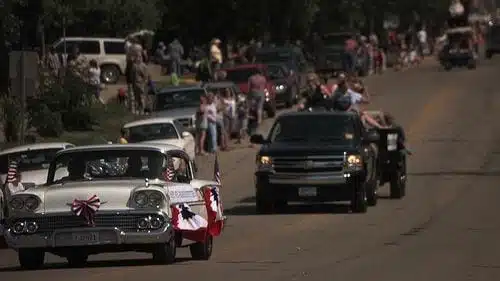
I admire the documentarian with the light touch. In fact, with Crude Independence, I was expecting something along the lines of King Corn, where two college kids begin with a blood test and end up creating a documentary about the dehumanization of massive agribusiness. They built the story from the ground up, never condescending to their subjects and never using the power of the filmmaker to project intentions, ill or otherwise. But Crude Independence has virtually no touch at all, which ends up leaving it in the awkward position of seeming to advocate rather simplistic solutions to the complex issues involved in global energy policy. Sometimes poorly executed objectivity can lead to clumsily unintentional propaganda. Crude Independence roughly traces the impact of the discovery of a huge shale oil deposition in the tiny North Dakotan village of Stanley. It’s these interviews where a judicious nudge would made the movie much more bearable: The townspeople discuss the impact in terms of the influx of roughnecks, sudden wealth, and the uneasiness of having financial security that rests on an industry notorious for boom-and-bust cycles and the economic wasteland left in their wake. But the conversations ramble interminably, rarely shedding insight upon anything other than small town life is really boring; so boring that the most interesting story in the film is told by a teenager who claims to have seen an extra-terrestrial in her boyfriend’s car. It quickly becomes one of the world’s most tedious Chamber of Commerce videos ever made. The roughneck segments meant to explain the nuts and bolts of the day-to-day life of their jobs falter because they’re wasted, shouting over one another and in the state of “I love you/I hate you” drunkenness. They make no sense and sound like raging idiots. While Noah Hutton’s long rambling tours through the town’s past give some sense of something somewhere having been lost; the viewer is certainly not compelled to play Mad Libs with the director. Is this industry destroying this town? Are small towns only transiently productive and possibly obsolete as permanent communities? I’m not offering a point of view, simply suggesting that there’s ton of material to work with here.
A group of roughnecks at a local bar
Only the segments in the county clerk’s office offer some of the meatier segments by explaining the difference between owning land and owning the mineral rights. Apparently, if you don’t own the mineral rights, a company can buy them, put an oil rig on your land, and decide what to offer you for the destruction of your property. At some point, the Sheriff notes that the industry with its huge trucks and massive traffic increase have destroyed the city’s roads. Well, maybe we can get an elected official on the screen to talk about the possibility of the company bearing a proportionate burden of its infrastructural damage. That’s why stories built from the ground like this can be so compelling and informative, because you can build out policy implications from the circumstances of the people you observe. If this is just supposed to be a portrait of a small town, it’s a bleak one with little more than blackouts, cheap motels, and a horizon blotted with cold, churning oil drills. When there is neither structure nor purpose in a documentary, the viewer is left in a floundering guessing game: Half projection, half dice roll.
July 4th in Stanley, North Dakota
At some point, the film simply needs someone with a historical perspective, someone who can shed light on this economic process of narrow minded development that does little to benefit the long-term communities that it upends, guts, and abandons. The closest to any kind of above ground perspective comes from Byron Dorgan (Democratic Senator) who says we should drill, drill, drill and that he hopes that the town will be prepared for the potential for a bust. He hopes? He’s a legislator, isn’t there something he can do to make sure that companies try to build healthy post-boom economies in the places that they temporarily occupy. Noah Hutton seems more in love with images of industry and blurry highway shots set to guitar solos than he does with the actual issue that he tangents through. That’s the trouble with having a story told in rambling yarns by people who might be good in nature, but have absolutely no idea about the amount of oil they’re producing or how it may or may not offset our dependence on “troubled” regions. You end up having the default position of the few articulate people in the documentary talking about the absolute need for unregulated drilling, the greatness of Bush’s energy policy, and the fact that some of the Stanley residents have been able to build towering Japanese waterfalls in their living rooms with fat oil checks. That’s entirely too shoddy a treatment for such a pressing, complicated issue and does no favor of the people of Stanley to deny them a bird’s eye view with a side of hope.

